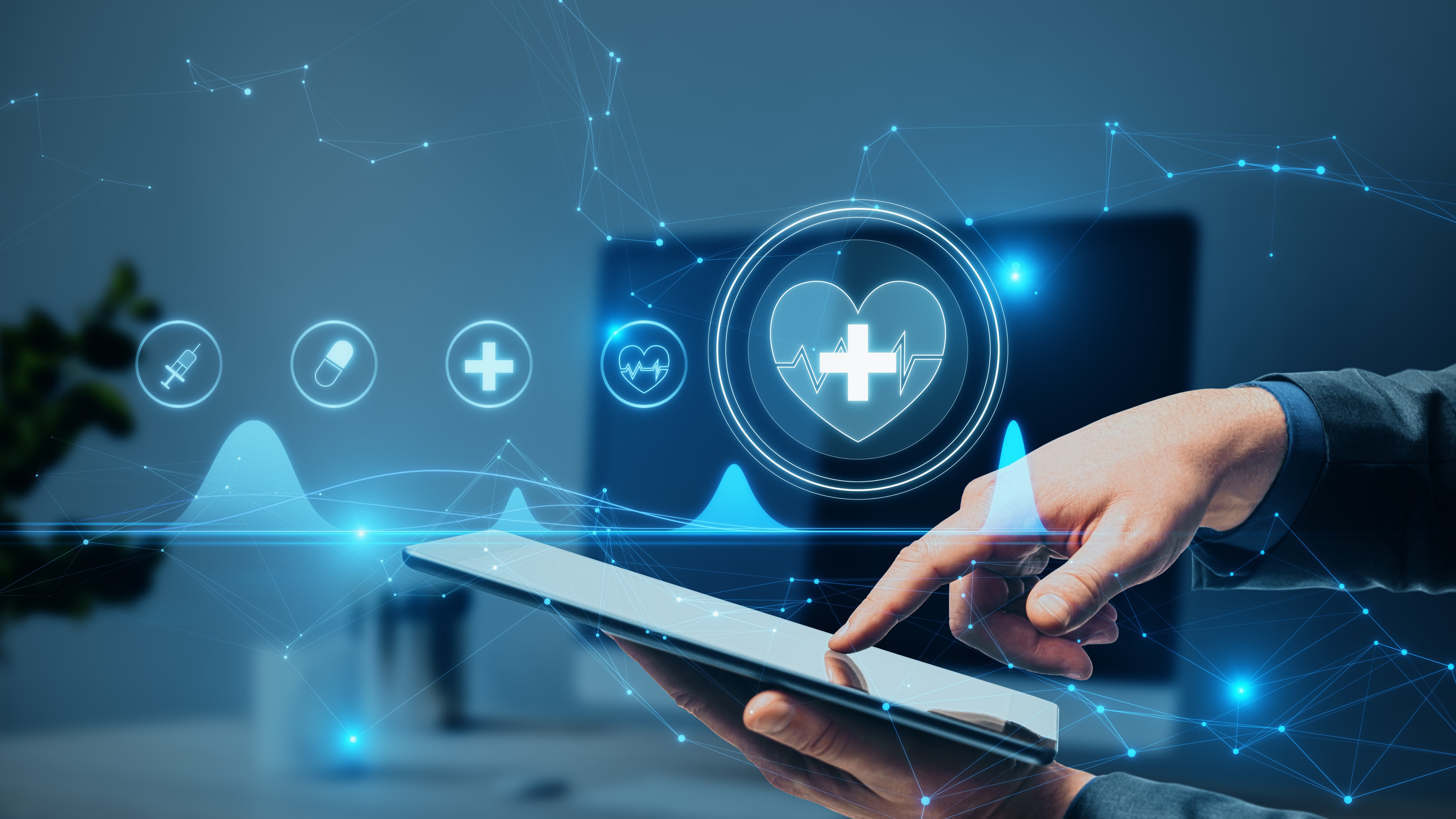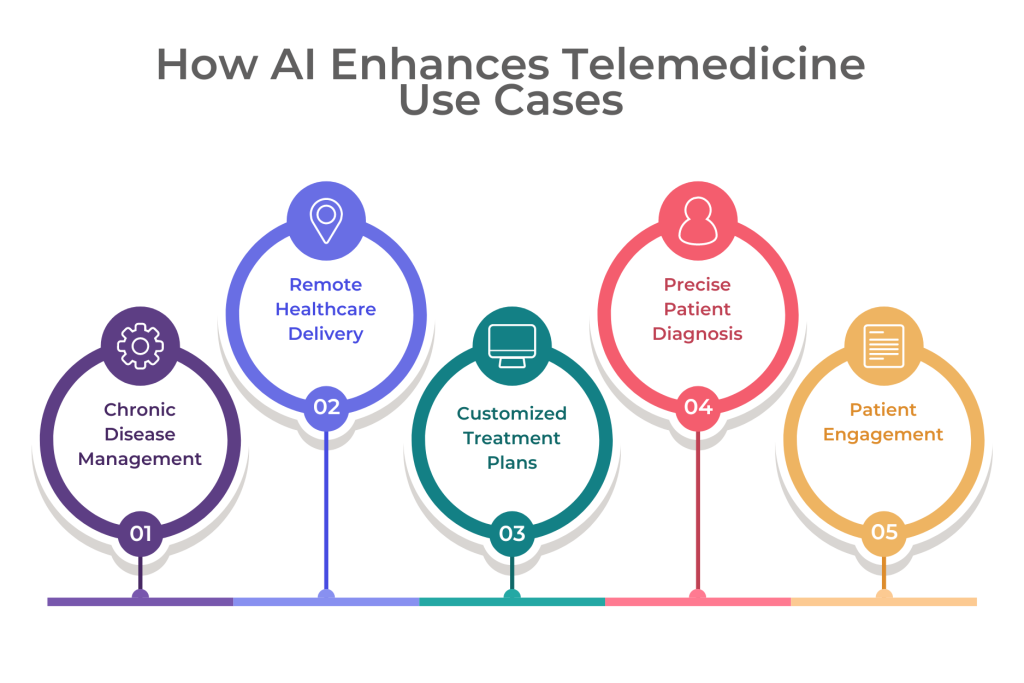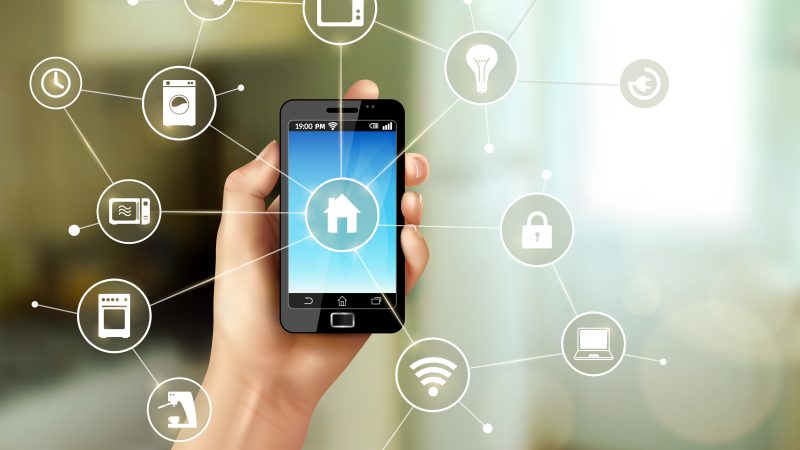How AI Enhances Telemedicine Use Cases

Introduction
The COVID-19 pandemic was a turning point in digital healthcare. Although many patients relied on smartphone applications for booking appointments, its use skyrocketed due to movement restrictions.
Patients and doctors benefitted from the scenario. It saved travel time for both parties. This led to an influx of smartphone applications flooding the market. Digital healthcare had finally arrived and gave birth to telemedicine.
Telemedicine applications extended their use from appointment booking and canceling to include pharmacy booking, insurance coverage claims, and remote digital healthcare services. The applications mushroomed due to cheap data connectivity plans and the availability of the cloud for the storage and management of patient data.
Telemedicine market capitalization to reach $286.22 billion by 2030 – Fortune Business Insights
The Boon of the Pandemic – Telemedicine
Telemedicine brought doctors to the homes of patients through virtual patient care, revolutionizing the way healthcare services are delivered. Patients can leverage virtual healthcare without the hassle of travel. It provides convenience and offered the same services that a patient is used to receive. It helped patients in taking preventive measures to diseases. Governments have granted approval to federal agencies like the Centers for Medicare and Medicaid Services (CMS) to include telemedicine services in their coverage.
Many telehealth platforms flourished due to the rise of digital health identities. It assisted in creating profiles of patients and their medical history. Platforms adhered to domestic and international guidelines in saving patient data and assisting doctors in their tasks.
You know those cool gadgets that healthcare folks use in telehealth apps? They’re like the superhero sidekicks, keeping tabs on patients’ vital stats in real-time. This superhero duo doesn’t wait around – it spots possible problems early on, giving healthcare pros the heads-up to jump in and save the day pronto!
Patients, in turn, experience a more personalized healthcare journey, receiving tailored advice and treatment plans based on their health data. Data was used to create and record the symptoms and solutions to many illnesses. This is where custom healthcare software development comes into play. Marrying artificial intelligence and machine learning will enhance the diagnostic capabilities of telemedicine, providing healthcare providers with valuable insights. As a result, they can utilize the capabilities of smart instruments and tablets to connect to the Internet of Things. The devices can monitor patient health by sending data to healthcare providers and contacting them during healthcare emergencies.
How will Telemedicine Sustain?
Telemedicine was the darling of healthcare providers due to its immense potential during the pandemic. However, it needs sweeping regulatory changes from elected officials for patients to avail the service. It aided in streamlining frontline services and making healthcare available for patients with serious conditions.
Furthermore, the lack of sticky user behavior on telemedicine app solutions has been a stumbling block in their integration into routine healthcare practices. Unlike social media or entertainment platforms that effortlessly capture and retain user attention, telemedicine apps often struggle to maintain consistent user engagement.
The transient nature of medical consultations and a historical preference for face-to-face interactions have resulted in a lack of chronic use and adherence to these digital healthcare solutions. Patients and doctors are required to change their traditional mindset and embrace new technologies. Strategic efforts to enhance the user experience can make telemedicine platforms more intuitive, personalized, and seamless. Telemedicine can truly thrive and transform the healthcare landscape by breaking free from the shackles of traditional norms and cultivating a sustained user commitment.
AI will be integrated into life-saving equipment, reemerging new applications and processes in the healthcare sector. It will eliminate redundant administrative tasks and offer novel breakthroughs in therapy and patient care.

Use Cases of AI in Telemedicine
Telemedicine will be the future of healthcare as digital health management platforms increase and investments continue to pour into the healthcare ecosystem. The evolution of viruses and the need for prompt medical responses will require the power of AI. Hospitals need to create customized healthcare applications for their patients. Here are some of their prioritized use cases.
- Remote Healthcare Delivery: AI-powered telemedicine transcends geographical barriers, providing unparalleled remote access to healthcare services. Enhanced by artificial intelligence (AI), it offers unmatched remote entry to healthcare provisions. Individuals can engage with healthcare experts from the comfort of their residences using virtual discussions and AI-driven mechanisms. Using AI algorithms enables adequate remote supervision, empowering physicians to evaluate real-time vital signs, symptoms, and medication adherence. This not only improves accessibility for individuals in distant locations but also simplifies the healthcare delivery procedure, alleviating the strain on conventional healthcare establishments.
- Chronic Disease Management: AI will revolutionize the management of chronic diseases. While managing chronic diseases, patients used to miss appointments due to the expenses of traveling. Telemedicine ensures that communication between the doctor and patient remains clear and transparent. Remote patient monitoring tools facilitate the transmission of information to caregivers. They can escalate the level of care as per the level of health. Health caregivers can use EHRs to simplify documentation and reduce the time spent on billing and revenue management.
- Customized Treatment Plans: AI algorithms can analyze patient medical history to create personalized and effective treatment plans. Mobile app development can use metrics of genetic makeup, lifestyle factors, and response to previous treatments to help healthcare practitioners create customized plans. This level of customization ensures that treatment plans are more effective and minimize potential side effects, optimizing the overall patient experience. It can improve patient engagement levels and provide primary care to patients living in remote or rural areas.
- Precise Patient Diagnosis: AI’s capacity for processing complex medical data has significantly enhanced diagnostic capabilities in telemedicine. Machine learning algorithms can aid doctors in their diagnoses by analyzing scans of patients, test results, and medical history of patients. As per a study published in Jama Network Open, it effectively diagnosed nearly 87% of patients accurately. It can create more avenues of exploration for telemedicine and demand for customized patient care.
- Patient Engagement: AI-driven telemedicine platforms transform patient engagement by fostering proactive and informed healthcare interactions. Virtual health assistants and chatbots help patients keep in touch with their caregivers. It allows patients to get medical care instantly through video conferencing without delaying the treatment. Telehealth applications assist patients in navigating the healthcare journey and prevent their health from declining. It engages patients by helping them stick to their doctor appointments and medication schedules.
Conclusion
Internet Soft is an AI development company that makes businesses stronger and effective in real-time. It has a team of experts that can train a customized AI to run tasks according to your process. Moreover, it can enhance your telemedicine application by using a combination of natural language processing and computer vision and bring the service to the forefront.
The digital healthcare industry has future use cases for disease modeling, digital twins for clinical trials, and smarter clinical development. Home healthcare will continue to evolve as smart devices are adopted by patients and doctors shift their business models.
Need AI to refine your patient touchpoints? Get in touch with Internet Soft today for a quick resolution.






